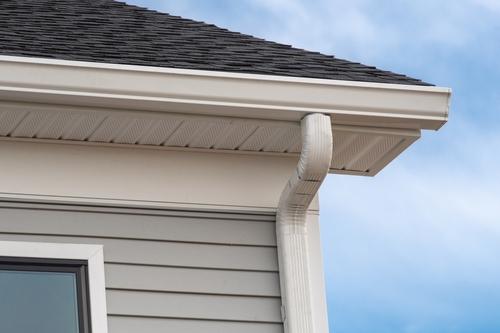
Key Takeaways
- Different materials offer unique benefits: aluminum is lightweight and rust-resistant, copper is durable and elegant, steel is strong but needs upkeep, and vinyl is affordable but less durable.
- Match your gutters to your home’s style and environment — choose materials that complement your architecture and handle local weather conditions.
- Consider durability and maintenance — copper and steel last longest but need care; aluminum and vinyl are lower maintenance but may wear out sooner.
- Budget smartly — factor in installation, upkeep, and longevity, not just the upfront price.
- Think sustainably — some materials, like aluminum and steel, are recyclable and more eco-friendly.
- Professional installation matters — experts ensure proper fit and long-term protection from leaks and water damage.
- Choose with the long term in mind — the right gutters protect your home’s structure, value, and curb appeal for decades.
Gutters are not just the unsung heroes of your home’s exterior; they play a pivotal role in protecting your property’s foundation, landscaping, and even its aesthetic appeal. When it comes to gutter materials, the choices can be overwhelming. Your location, climate, and the architecture of your home are just a few factors that should influence your decision. Here’s a comprehensive guide to choosing the right gutter material that not only complements your house but also withstands the test of time.
Understanding Different Gutter Materials
Before we jump into the decision-making process, it’s essential to understand the options you have in the market. Here are the four most common materials:
One of the most popular choices due to its availability, lightweight nature, and resistance to rust. Available in various colors, they can be painted and are relatively affordable.
At the high end of the spectrum are copper gutters, offering a distinctive look and exceptional durability. They tarnish over time, adding a rustic aesthetic to the home.
Known for their strength and ability to handle heavy debris, steel gutters are a powerful choice. They can be painted to match the house but require regular maintenance to prevent rust.
The most budget-friendly option, vinyl gutters are easy to install and do not corrode. However, they are less durable and can become brittle in extreme weather conditions.
The choice between these materials will largely depend on your budget, maintenance preferences, and the climate where you live.
Assess Your Home’s Style and Surroundings
Gutters are not just about functionality; they also have a significant impact on the visual aesthetics of your home. Consider the architectural style of your house and what would complement it best. Traditional homes often pair well with copper or a deep-toned aluminum, while modern designs might favor the clean lines of steel or high-quality PVC.
Look at your surroundings too; do you have a lot of trees that could mean regular cleaning, or is your home near the coast, where salt air could impact certain materials? All of these factors should help guide your decision.
Durability and Maintenance
Evaluate the time and effort you’re willing to invest in gutter maintenance. Copper and steel gutters are more durable but will require painting over time. Conversely, aluminum and vinyl gutters require less maintenance but may need to be replaced sooner.
It’s important to consider if you’re likely to conduct regular maintenance or if long stretches of time may pass between inspections. The right balance between durability and your maintenance routine will save you money and hassle in the long run.
Budget Considerations
Your budget is, of course, a significant factor. While the initial cost of materials may vary, consider other expenses like installation, maintenance, and longevity.
Copper gutters are at the top end of cost, but they are incredibly durable and can last for decades with the right care. On the other hand, vinyl is the cheapest option, but you may find yourself replacing them sooner than other materials.
Environmental Impact
The environment is another factor to take into account. Certain materials might require the use of specific sealants or paints, which could emit volatile organic compounds (VOCs) into the air. Additionally, some materials can be recycled at the end of their lifecycle, while others are not as easily repurposed.
If environmental sustainability is important to you, consider a gutter system that is made of recycled materials or can be recycled at the end of its life without harmful effects.
Professional Consultation and Installation
After you’ve considered all these factors, it’s time to consult with a professional gutter installer. They can offer advice on the best material based on their experience and the specifics of your home.
Professional installation is also crucial, as it ensures the gutters are fitted correctly to prevent leaks and water damage. Do not attempt to do it yourself if you are not experienced, as it could lead to more significant problems down the line.
Long-Term Benefits
Remember, the right gutter material is an investment in the longevity and health of your home. It’s worth spending the time to research and understand which material is the best fit for your needs.
Choosing the right gutter material isn’t just about finding something that works for now; it’s about picking a material that will continue to protect your home for years to come. By considering all the factors, from style to durability, you can ensure you choose the perfect material for your home.
Frequently Asked Questions
- What’s the most popular gutter material for homes?
Aluminum is the top choice because it’s affordable, rust-resistant, and available in many colors. - Are copper gutters worth the cost?
Yes. While expensive, they’re highly durable, long-lasting, and develop a unique patina that enhances curb appeal. - Which gutter material requires the least maintenance?
Vinyl and aluminum require the least upkeep, though vinyl may become brittle in extreme temperatures. - How do I know which gutter material suits my climate?
In humid or coastal areas, aluminum and copper resist corrosion best; steel is ideal for heavy snow or debris loads. - Should I install gutters myself or hire a professional?
Hire a professional. Proper installation ensures correct slope, secure fastening, and leak-free performance.



